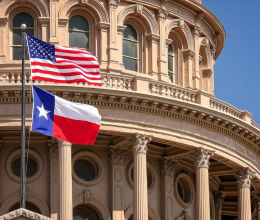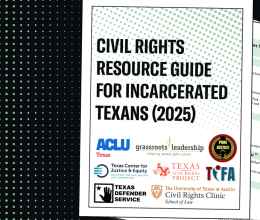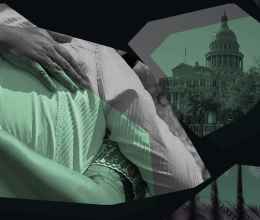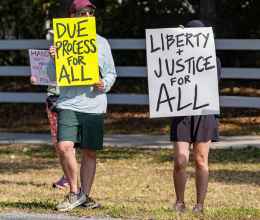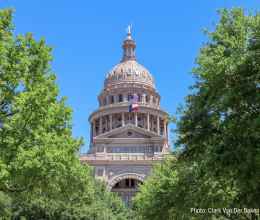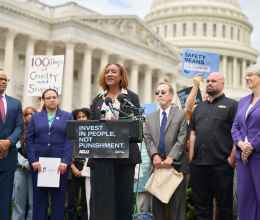
Web Posted: 04/09/2006 12:00 AM CDT
Abe Levy
Express-News Staff Writer
KENEDY -- Of the 130-plus religions claimed by inmates in the Texas prison system, Ennis Dewayne Davis chose Judaism.
An African American and former Christian, he said he's used to getting incredulous looks and having to give an explanation.
"I've learned that all the monotheistic faiths date back to Judaism," said Davis, seated next to fair-skinned inmates during a Jewish educational meeting at the system's Connally Unit.
"I thought if Judaism is the original religion, then maybe that's the one I should learn."
Whether this is jailhouse religion or true Judaism is a sticky matter for the Texas prison system. Yet this question - and its impact on prison chow - is at the heart of a federal lawsuit against the Texas Department of Criminal Justice.
The suit, filed last year by the Becket Fund for Religious Liberty in Washington D.C., seeks to force TDCJ to provide daily kosher meals to a Jewish inmate in Houston. He is one of 861 inmates who claim to be Jewish in Texas and who could benefit from the suit's outcome. However, only 75 are considered bona fide Jews by the state's three Jewish chaplains.
In recent weeks, negotiations have become more frequent and intense among TDCJ officials, prison chaplains and Becket Fund lawyers. All sides have said they are working for a solution that would avoid a trial.
The Becket Fund estimates that 32 states adequately provide kosher meals to inmates, although the Aleph Institute, a nonprofit Jewish advocacy group in Florida that provides kosher meals to Jewish inmates, says the number is closer to 25.
Texas provides non-pork and non-meat meals to inmates but they don't meet the kosher test. For Jewish holidays, the Aleph Institute and Jewish chaplains work to ensure kosher and ritual meals are available to Jewish inmates.
Kosher food is produced according to a strict set of standards beyond just the avoidance of pork. Dairy and meat must not be mixed and care must be taken with the way food is obtained, stored and prepared in a highly clean environment that keeps non-kosher and kosher instruments and food apart.
Such meals would be an added expense to the state and would require new policies to deal with the unknown number of inmates who would qualify for them.
Texas prisoners can declare a new religion once a year. They are then limited to that faith's services, educational programs and holidays.
Max Moussazadeh, who was convicted of capital murder and is housed at the Eastham Unit in Lovelady, has evidence that he grew up in an observant Jewish home, eating strictly kosher food and attending Jewish services.
"I feel that I am going against my beliefs and that I will be punished by God for not practicing my religion correctly," he's quoted as saying in the lawsuit.
In recent weeks, Jewish chaplains - mindful of the lawsuit - have met with prison officials to work out a proposed settlement. It includes setting up a kosher kitchen in designated prison units or buying pre-packaged kosher food from a kosher vendor.
State "agency leaders are looking at all the different angles to provide a solution," said Bill Pierce, director of chaplaincy for TDCJ, declining further comment on the status of talks because the case is pending.
A spokesman for the Texas attorney general's office, which is representing TDCJ, also declined comment.
Becket Fund lawyers said they are cautiously optimistic that Texas will make changes.
"The state can accommodate this kind of thing," said Eric Rassbach, a Becket Fund lawyer in charge of the case. "It can allow people not to do what they consider defiling themselves on a daily basis. We're hopeful there will be a settlement in this case, but by no means are we certain of this."
The suit claims a violation of the Religious Land Use and Institutionalized Persons Act of 2000, a federal law aimed in part at protecting the religious rights of inmates.
The matter, Pierce said, is difficult because inmates have used religion for insincere reasons. In the 1990s, Texas prisons offered kosher meals and a groundswell of inmates claimed Judaism as their faith.
In addition to the benefits of diet, they were seeking time off from obligatory work at their units by qualifying for Jewish holidays, he said.
"Some offenders wanted to be Jewish Muslims because of the holidays," he said.
Rabbi Yosef Marrus of San Antonio is among three Jewish chaplains contracted by Texas. As an orthodox rabbi, he believes every soul in prison, including the few who are Jewish, is worthy of his visit from the free world.
Of the six who attended his monthly meeting at the Connally Unit, only three are confirmed Jewish, he said. As such, Marrus only permitted those three to pray with Tefillin, the ritual boxes of Scripture bound to the head and arm by Jewish men.
Marrus, who has worked with Jewish inmates for eight years, said he's able to make determinations based on personal interviews, birth and family data and observing an inmate's behavior and knowledge of the Jewish faith.
But a rabbi making such determinations is different from the state of Texas doing the same, Pierce said. The prison system doesn't, for example, make records of whether inmates consistently eat pork as a way to ensure they're observant believers of a faith that prohibits it.
"We want to give them as much leeway as possible," he said. "We're not going to be the kitchen police in that way."
Some states have required inmates to endure interviews by rabbis to ensure they are sincerely Jewish and give rabbis the power to reject an inmate who is found not to be sincere, said Bob Moore, director of legal affairs for the Aleph Institute.
"Prisons are sick and tired of bankrolling these guys' dietary whims," he said, "when their beliefs are in fact not sincere."
[email protected]
